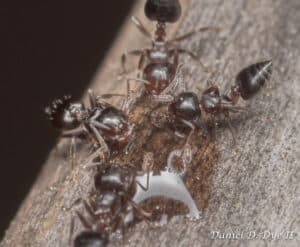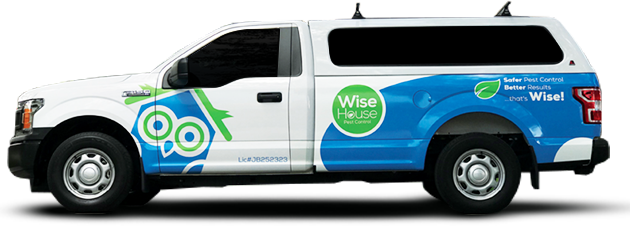Acrobat ants have a distinctive heart-shaped abdomens and acrobatic postures, this ant species are a common nuisance in South Florida homes. These tiny pests are known for their ability to nest in a wide range of locations, from damp wood to wall voids, making them a persistent challenge for many Floridians. However, understanding their behavior and implementing preventive measures can significantly reduce the risk of these unwanted guests taking up residence in your home.
In this blog, we cover everything you need to know about acrobat ants, exploring their unique characteristics, and nesting habits. We also provide practical and effective strategies to prevent infestations, allowing you to safeguard your home from these unwanted pests.

The acrobat ant, also known as Crematogaster, is a fascinating and prevalent pest found in South Florida. These small ants, typically ranging from 2.5 to 3.8 millimeters in length, are easily recognized by their distinctive heart-shaped abdomens, which they raise above their heads in a characteristic acrobatic pose when alarmed. This unique behavior, combined with their light brown to black coloration, sets them apart from other ant species.
Acrobat ants are adaptable and resourceful, establishing nests in various environments, both indoors and outdoors. In homes, they may be found in wall voids, behind baseboards, or even within electrical outlets. Outdoors, they construct nests in rotting wood, tree cavities, and soil. These ants are omnivorous, feeding on a wide range of food sources, including honeydew produced by aphids, other insects, and even sweets or proteins found in homes.
Acrobat ants can become a nuisance due to their ability to infest homes and their potential to deliver a painful sting when disturbed. Their nests can also cause structural damage to wood, especially if it is already damp or decaying. Understanding their behavior and biology is important for effective control and prevention of ant infestations.
Acrobat ants are fascinating little pests with distinct behaviors that set them apart from other ant species. Their most notable characteristic is the ability to raise their heart-shaped abdomens above their heads when alarmed, resembling a performing acrobat. This defensive posture, accompanied by a release of a foul odor, is intended to deter predators.
While they are omnivorous, acrobat ants have a particular fondness for honeydew, a sugary substance secreted by aphids and other plant-sucking insects. They often tend to these insects, protecting them from predators in exchange for a steady supply of honeydew. This symbiotic relationship is essential to their survival.
With regards to their biology, acrobat ants have a complex life cycle with distinct stages: egg, larva, pupa, and adult. Colonies typically contain multiple queens, which lay eggs that hatch into larvae. These larvae are cared for by worker ants and eventually pupate before emerging as adults. The colony is organized into different castes, each with specific roles and responsibilities.
Workers forage for food, care for the young, and maintain the nest, while soldiers defend the colony from threats. The presence of multiple queens ensures the colony’s survival and allows for rapid population growth. These unique behaviors and biological characteristics make acrobat ants a fascinating and ecologically important species in South Florida’s diverse ecosystems.
These small ants, typically ranging from 2.5 to 3.8 millimeters in length, are known for their light brown to black coloration and distinctive heart-shaped abdomens. When alarmed, they exhibit a characteristic “acrobatic” pose, raising their abdomens above their heads while releasing a foul odor.
If you observe ants behaving in this way, it’s a strong indicator that you’re dealing with acrobat ants. Other signs of their presence include small piles of debris near entry points like cracks in walls or foundations, as well as trails leading to potential food sources like honeydew-producing insects on plants.
While they may be mistaken for carpenter ants due to their similar nesting habits in wood, acrobat ants don’t cause the same kind of structural damage.
Clear Clutter
Acrobat ants are notorious for seeking out cluttered areas as prime nesting sites. Be diligent in decluttering your home, paying special attention to moisture-prone areas like basements, bathrooms, and garages. These spaces often attract ants due to the potential for water leaks, condensation, and dampness.
Regular Plant Inspections
Acrobat ants have a symbiotic relationship with honeydew-producing insects like aphids. These pests infest plants and secrete a sugary substance that ants love. Regularly inspect your indoor and outdoor plants for signs of aphids or other honeydew producers.
Maintain Dry Conditions
Acrobat ants thrive in moist environments. To discourage their presence, ensure proper ventilation in areas prone to dampness, such as bathrooms and kitchens. Use exhaust fans or open windows to reduce humidity levels. If necessary, employ dehumidifiers to maintain optimal humidity levels, making your home less appealing to these moisture-seeking pests.
Deny Entry
Prevention is key in pest control. Inspect your home’s exterior thoroughly, paying close attention to the foundation, walls, and areas around windows and doors. Seal any cracks or gaps with caulk or weatherstripping. This simple step can effectively prevent acrobat ants from entering your home and establishing colonies.
Opt for Non-Toxic Baits
If you encounter acrobat ants, you may consider using borax-based bait stations. These baits are less toxic than chemical insecticides, making them a safer option for households with pets and children. The ants will carry the bait back to their nest, effectively eliminating the colony from within.
Professional Inspection
If your DIY efforts prove unsuccessful or the infestation seems too overwhelming, don’t hesitate to seek professional help. A pest control expert can thoroughly inspect your property, identify the source of the infestation, and recommend a targeted treatment plan tailored to your specific needs. Their expertise and experience will ensure effective and long-lasting results.
Acrobat ants are not typically aggressive, but they can sting if they feel threatened. While their stings are usually not severe, they can cause discomfort and mild pain. If you have allergies to insect stings, it’s important to exercise caution and seek medical attention if necessary.
Acrobat ants can nest in wood, particularly if it is damp or decaying. While they don’t cause extensive structural damage like termites, their nesting activities can weaken wood over time. Promptly addressing infestations is important to prevent potential damage.
Acrobat ants are not known to transmit diseases directly to humans. However, like any pest, they can contaminate surfaces and food sources with bacteria they pick up from their environment, posing a potential health risk.
While rare, acrobat ants may sting pets if they feel threatened. The sting is usually not dangerous, but it can cause discomfort. If your pet exhibits signs of an allergic reaction, such as swelling, difficulty breathing, or excessive drooling, seek veterinary care.
Acrobat ants are attracted to sweet and protein-rich foods. If they gain access to your pantry or kitchen, they can contaminate food sources, making it necessary to discard any potentially affected items.
Winged ants are reproductive members of a colony, and their presence may indicate a mature nest. While some acrobat ant species have winged forms, it’s important to accurately identify the species to determine the best course of action.

Ready to send away pests without harming your pets? Getting started with Wise House Environmental Services is as easy as 1-2-3:
With Wise House Environmental Services, you get more than just effective pest control; you get peace of mind, knowing that your home is without pests and safer for your pets.
Our approach to pest control combines science with safety, offering you the kind of targeted, effective solutions that you won’t find with just any other pest control service. Our services have made a world of difference for homeowners, and we can do the same for you. Your pets will thank you for it!
We serve Port St. Lucie,Lake Worth, Boyton Beach, Palm Beachand the Treasure Coast.


© 2023 All Rights Reserved. | Sitemap